Nursing Career Goals, Education, and Role in Healthcare System
VerifiedAdded on 2022/08/22
|6
|1337
|14
Homework Assignment
AI Summary
This assignment explores various nursing career options, including certified dialysis nurse, legal nurse consultant, and nurse midwife, highlighting the importance of education for career advancement. The author sets goals to provide excellent patient-centered care, incorporate technology, and pursue a Master's degree in nursing, specifically in the field of a clinical nurse specialist. The paper emphasizes the need for continuous learning to meet the evolving demands of the healthcare system and the importance of advanced learning for specialization. It also discusses the relationship between continuous nursing education, competency, attitudes, knowledge, and the ANA Scope and Standards for Practice and Code of Ethics, emphasizing the role of mandatory continuing education in enhancing nurses' skills and knowledge, ultimately leading to improved patient outcomes. The paper references several studies supporting the benefits of lifelong learning in nursing, including improved critical thinking, competency, and the ability to adapt to evidence-based practices.
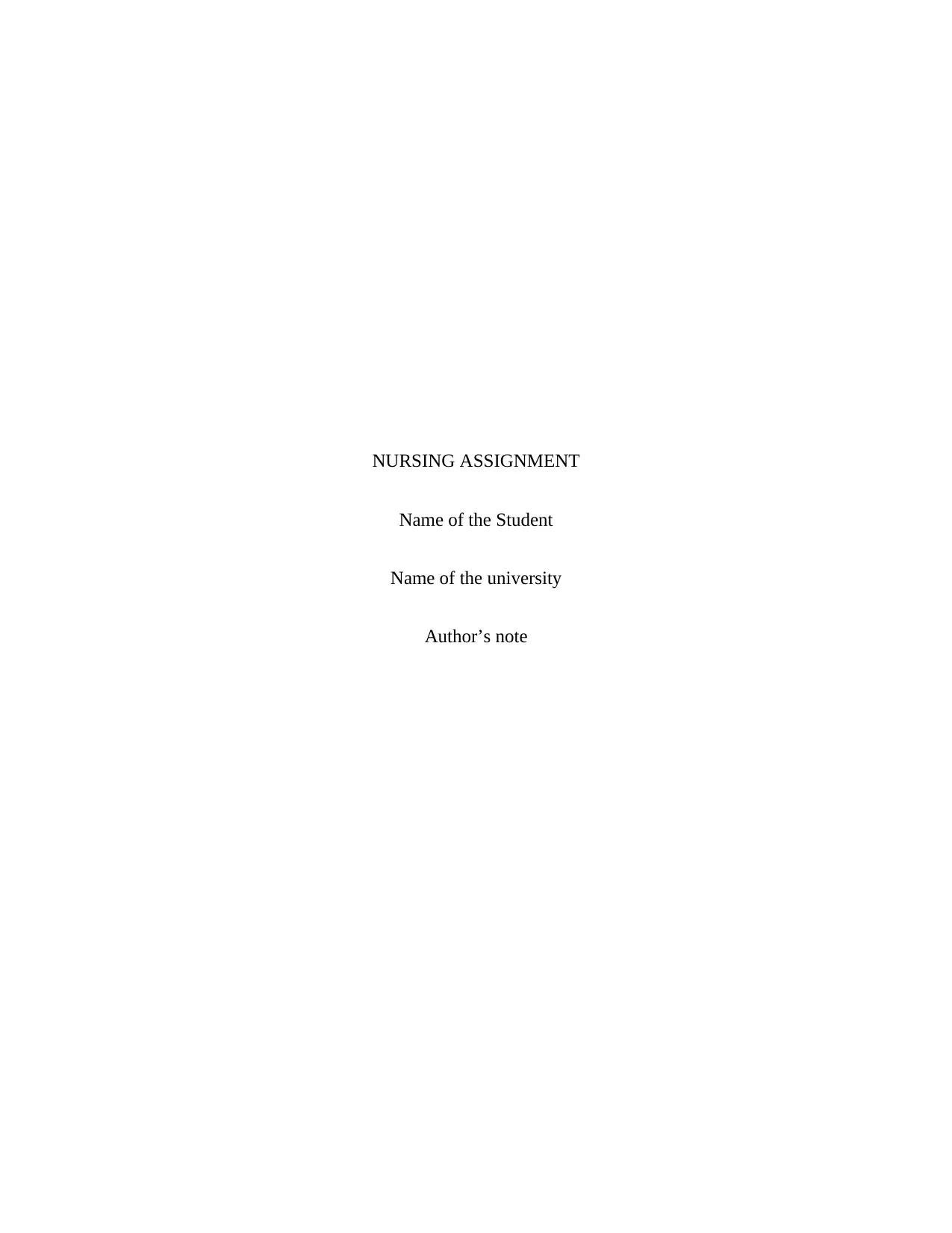
NURSING ASSIGNMENT
Name of the Student
Name of the university
Author’s note
Name of the Student
Name of the university
Author’s note
Paraphrase This Document
Need a fresh take? Get an instant paraphrase of this document with our AI Paraphraser
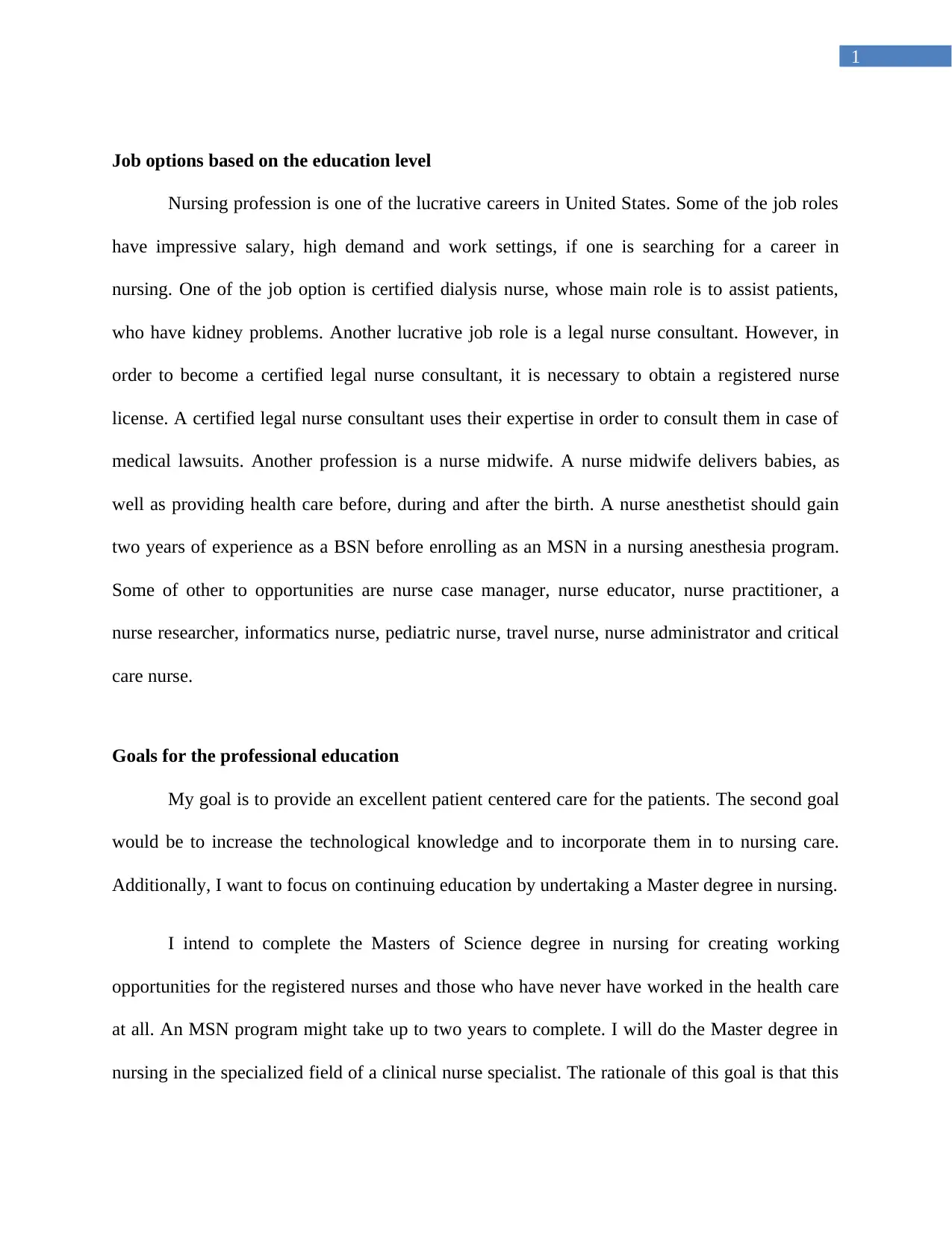
1
Job options based on the education level
Nursing profession is one of the lucrative careers in United States. Some of the job roles
have impressive salary, high demand and work settings, if one is searching for a career in
nursing. One of the job option is certified dialysis nurse, whose main role is to assist patients,
who have kidney problems. Another lucrative job role is a legal nurse consultant. However, in
order to become a certified legal nurse consultant, it is necessary to obtain a registered nurse
license. A certified legal nurse consultant uses their expertise in order to consult them in case of
medical lawsuits. Another profession is a nurse midwife. A nurse midwife delivers babies, as
well as providing health care before, during and after the birth. A nurse anesthetist should gain
two years of experience as a BSN before enrolling as an MSN in a nursing anesthesia program.
Some of other to opportunities are nurse case manager, nurse educator, nurse practitioner, a
nurse researcher, informatics nurse, pediatric nurse, travel nurse, nurse administrator and critical
care nurse.
Goals for the professional education
My goal is to provide an excellent patient centered care for the patients. The second goal
would be to increase the technological knowledge and to incorporate them in to nursing care.
Additionally, I want to focus on continuing education by undertaking a Master degree in nursing.
I intend to complete the Masters of Science degree in nursing for creating working
opportunities for the registered nurses and those who have never have worked in the health care
at all. An MSN program might take up to two years to complete. I will do the Master degree in
nursing in the specialized field of a clinical nurse specialist. The rationale of this goal is that this
Job options based on the education level
Nursing profession is one of the lucrative careers in United States. Some of the job roles
have impressive salary, high demand and work settings, if one is searching for a career in
nursing. One of the job option is certified dialysis nurse, whose main role is to assist patients,
who have kidney problems. Another lucrative job role is a legal nurse consultant. However, in
order to become a certified legal nurse consultant, it is necessary to obtain a registered nurse
license. A certified legal nurse consultant uses their expertise in order to consult them in case of
medical lawsuits. Another profession is a nurse midwife. A nurse midwife delivers babies, as
well as providing health care before, during and after the birth. A nurse anesthetist should gain
two years of experience as a BSN before enrolling as an MSN in a nursing anesthesia program.
Some of other to opportunities are nurse case manager, nurse educator, nurse practitioner, a
nurse researcher, informatics nurse, pediatric nurse, travel nurse, nurse administrator and critical
care nurse.
Goals for the professional education
My goal is to provide an excellent patient centered care for the patients. The second goal
would be to increase the technological knowledge and to incorporate them in to nursing care.
Additionally, I want to focus on continuing education by undertaking a Master degree in nursing.
I intend to complete the Masters of Science degree in nursing for creating working
opportunities for the registered nurses and those who have never have worked in the health care
at all. An MSN program might take up to two years to complete. I will do the Master degree in
nursing in the specialized field of a clinical nurse specialist. The rationale of this goal is that this
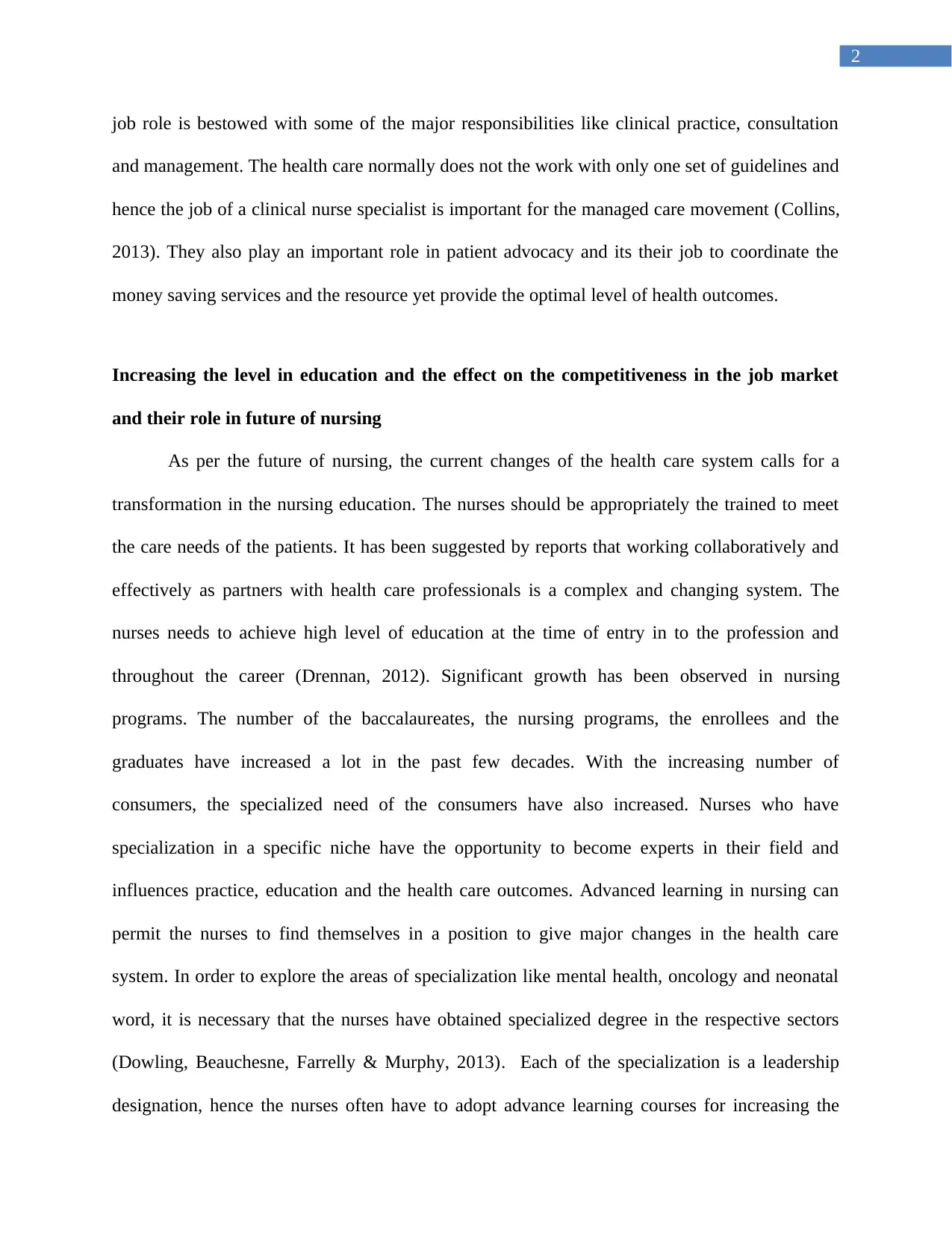
2
job role is bestowed with some of the major responsibilities like clinical practice, consultation
and management. The health care normally does not the work with only one set of guidelines and
hence the job of a clinical nurse specialist is important for the managed care movement (Collins,
2013). They also play an important role in patient advocacy and its their job to coordinate the
money saving services and the resource yet provide the optimal level of health outcomes.
Increasing the level in education and the effect on the competitiveness in the job market
and their role in future of nursing
As per the future of nursing, the current changes of the health care system calls for a
transformation in the nursing education. The nurses should be appropriately the trained to meet
the care needs of the patients. It has been suggested by reports that working collaboratively and
effectively as partners with health care professionals is a complex and changing system. The
nurses needs to achieve high level of education at the time of entry in to the profession and
throughout the career (Drennan, 2012). Significant growth has been observed in nursing
programs. The number of the baccalaureates, the nursing programs, the enrollees and the
graduates have increased a lot in the past few decades. With the increasing number of
consumers, the specialized need of the consumers have also increased. Nurses who have
specialization in a specific niche have the opportunity to become experts in their field and
influences practice, education and the health care outcomes. Advanced learning in nursing can
permit the nurses to find themselves in a position to give major changes in the health care
system. In order to explore the areas of specialization like mental health, oncology and neonatal
word, it is necessary that the nurses have obtained specialized degree in the respective sectors
(Dowling, Beauchesne, Farrelly & Murphy, 2013). Each of the specialization is a leadership
designation, hence the nurses often have to adopt advance learning courses for increasing the
job role is bestowed with some of the major responsibilities like clinical practice, consultation
and management. The health care normally does not the work with only one set of guidelines and
hence the job of a clinical nurse specialist is important for the managed care movement (Collins,
2013). They also play an important role in patient advocacy and its their job to coordinate the
money saving services and the resource yet provide the optimal level of health outcomes.
Increasing the level in education and the effect on the competitiveness in the job market
and their role in future of nursing
As per the future of nursing, the current changes of the health care system calls for a
transformation in the nursing education. The nurses should be appropriately the trained to meet
the care needs of the patients. It has been suggested by reports that working collaboratively and
effectively as partners with health care professionals is a complex and changing system. The
nurses needs to achieve high level of education at the time of entry in to the profession and
throughout the career (Drennan, 2012). Significant growth has been observed in nursing
programs. The number of the baccalaureates, the nursing programs, the enrollees and the
graduates have increased a lot in the past few decades. With the increasing number of
consumers, the specialized need of the consumers have also increased. Nurses who have
specialization in a specific niche have the opportunity to become experts in their field and
influences practice, education and the health care outcomes. Advanced learning in nursing can
permit the nurses to find themselves in a position to give major changes in the health care
system. In order to explore the areas of specialization like mental health, oncology and neonatal
word, it is necessary that the nurses have obtained specialized degree in the respective sectors
(Dowling, Beauchesne, Farrelly & Murphy, 2013). Each of the specialization is a leadership
designation, hence the nurses often have to adopt advance learning courses for increasing the
⊘ This is a preview!⊘
Do you want full access?
Subscribe today to unlock all pages.

Trusted by 1+ million students worldwide
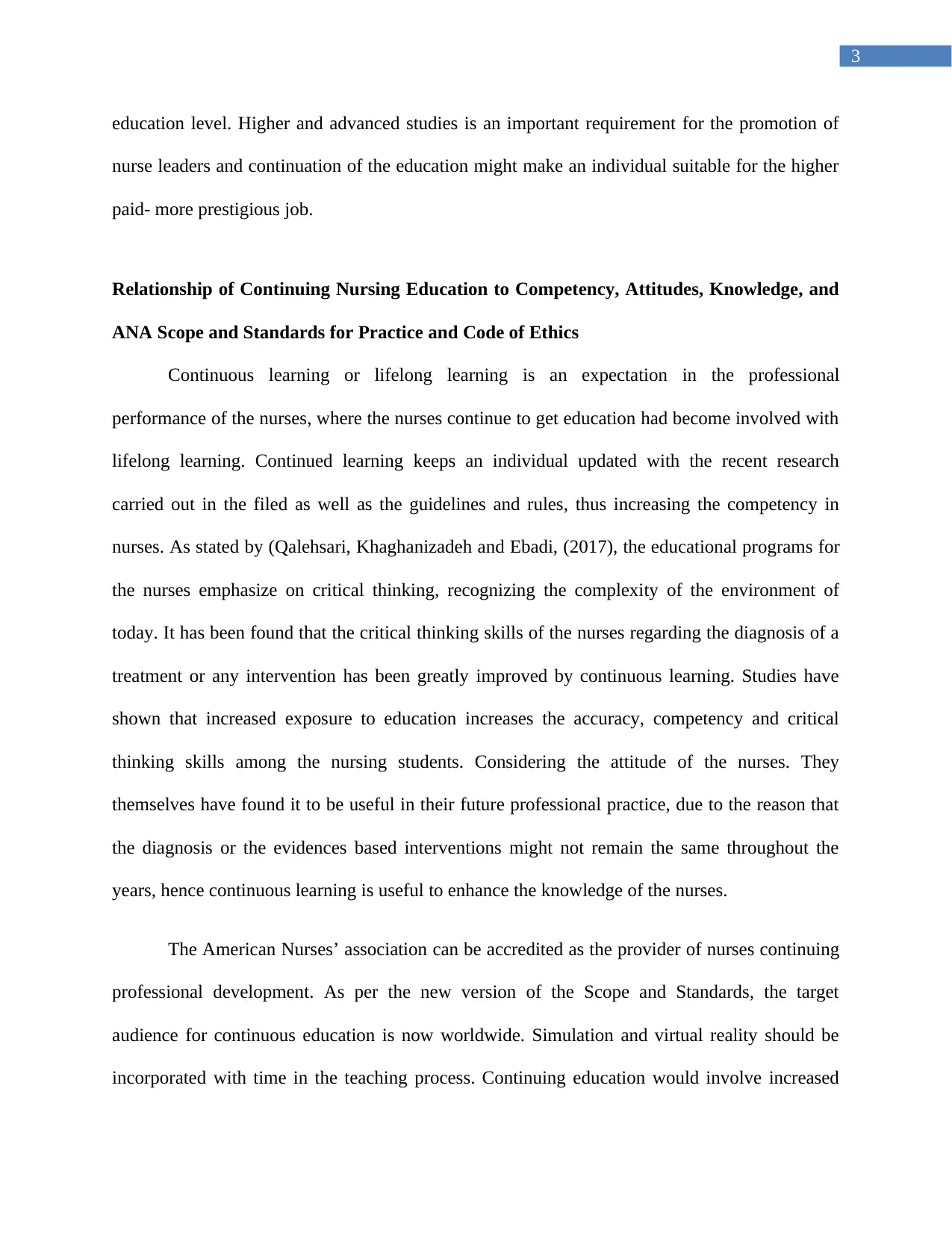
3
education level. Higher and advanced studies is an important requirement for the promotion of
nurse leaders and continuation of the education might make an individual suitable for the higher
paid- more prestigious job.
Relationship of Continuing Nursing Education to Competency, Attitudes, Knowledge, and
ANA Scope and Standards for Practice and Code of Ethics
Continuous learning or lifelong learning is an expectation in the professional
performance of the nurses, where the nurses continue to get education had become involved with
lifelong learning. Continued learning keeps an individual updated with the recent research
carried out in the filed as well as the guidelines and rules, thus increasing the competency in
nurses. As stated by (Qalehsari, Khaghanizadeh and Ebadi, (2017), the educational programs for
the nurses emphasize on critical thinking, recognizing the complexity of the environment of
today. It has been found that the critical thinking skills of the nurses regarding the diagnosis of a
treatment or any intervention has been greatly improved by continuous learning. Studies have
shown that increased exposure to education increases the accuracy, competency and critical
thinking skills among the nursing students. Considering the attitude of the nurses. They
themselves have found it to be useful in their future professional practice, due to the reason that
the diagnosis or the evidences based interventions might not remain the same throughout the
years, hence continuous learning is useful to enhance the knowledge of the nurses.
The American Nurses’ association can be accredited as the provider of nurses continuing
professional development. As per the new version of the Scope and Standards, the target
audience for continuous education is now worldwide. Simulation and virtual reality should be
incorporated with time in the teaching process. Continuing education would involve increased
education level. Higher and advanced studies is an important requirement for the promotion of
nurse leaders and continuation of the education might make an individual suitable for the higher
paid- more prestigious job.
Relationship of Continuing Nursing Education to Competency, Attitudes, Knowledge, and
ANA Scope and Standards for Practice and Code of Ethics
Continuous learning or lifelong learning is an expectation in the professional
performance of the nurses, where the nurses continue to get education had become involved with
lifelong learning. Continued learning keeps an individual updated with the recent research
carried out in the filed as well as the guidelines and rules, thus increasing the competency in
nurses. As stated by (Qalehsari, Khaghanizadeh and Ebadi, (2017), the educational programs for
the nurses emphasize on critical thinking, recognizing the complexity of the environment of
today. It has been found that the critical thinking skills of the nurses regarding the diagnosis of a
treatment or any intervention has been greatly improved by continuous learning. Studies have
shown that increased exposure to education increases the accuracy, competency and critical
thinking skills among the nursing students. Considering the attitude of the nurses. They
themselves have found it to be useful in their future professional practice, due to the reason that
the diagnosis or the evidences based interventions might not remain the same throughout the
years, hence continuous learning is useful to enhance the knowledge of the nurses.
The American Nurses’ association can be accredited as the provider of nurses continuing
professional development. As per the new version of the Scope and Standards, the target
audience for continuous education is now worldwide. Simulation and virtual reality should be
incorporated with time in the teaching process. Continuing education would involve increased
Paraphrase This Document
Need a fresh take? Get an instant paraphrase of this document with our AI Paraphraser
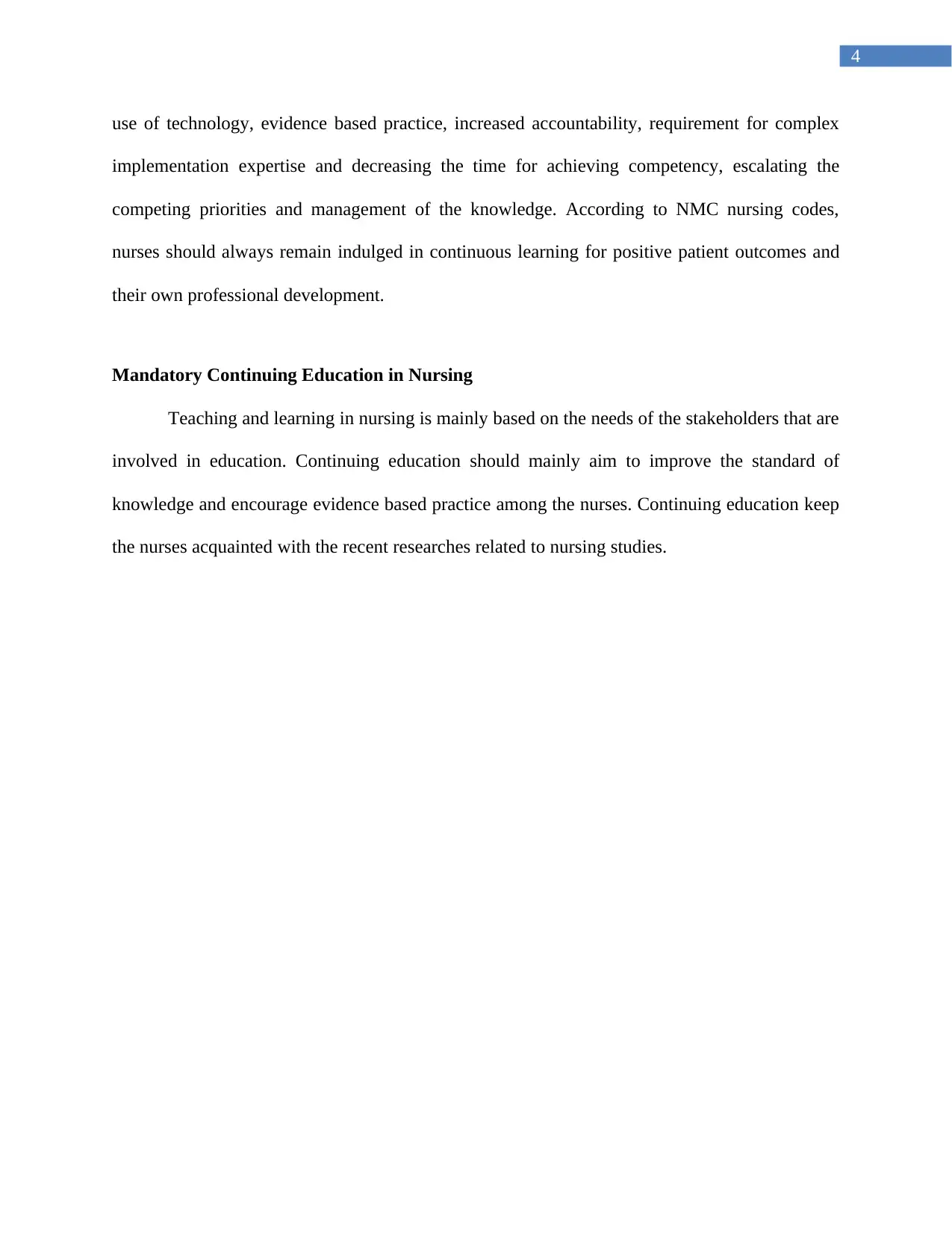
4
use of technology, evidence based practice, increased accountability, requirement for complex
implementation expertise and decreasing the time for achieving competency, escalating the
competing priorities and management of the knowledge. According to NMC nursing codes,
nurses should always remain indulged in continuous learning for positive patient outcomes and
their own professional development.
Mandatory Continuing Education in Nursing
Teaching and learning in nursing is mainly based on the needs of the stakeholders that are
involved in education. Continuing education should mainly aim to improve the standard of
knowledge and encourage evidence based practice among the nurses. Continuing education keep
the nurses acquainted with the recent researches related to nursing studies.
use of technology, evidence based practice, increased accountability, requirement for complex
implementation expertise and decreasing the time for achieving competency, escalating the
competing priorities and management of the knowledge. According to NMC nursing codes,
nurses should always remain indulged in continuous learning for positive patient outcomes and
their own professional development.
Mandatory Continuing Education in Nursing
Teaching and learning in nursing is mainly based on the needs of the stakeholders that are
involved in education. Continuing education should mainly aim to improve the standard of
knowledge and encourage evidence based practice among the nurses. Continuing education keep
the nurses acquainted with the recent researches related to nursing studies.
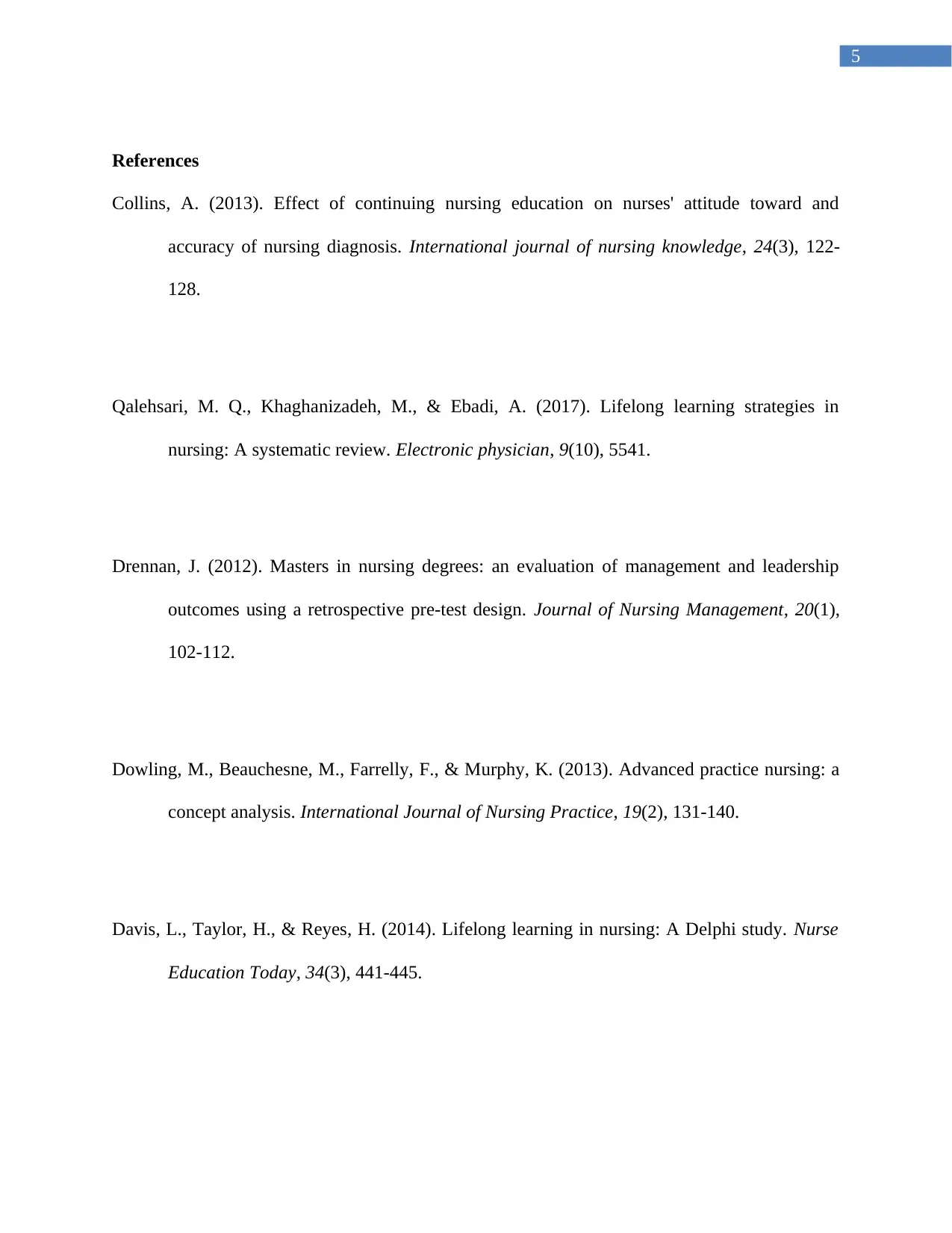
5
References
Collins, A. (2013). Effect of continuing nursing education on nurses' attitude toward and
accuracy of nursing diagnosis. International journal of nursing knowledge, 24(3), 122-
128.
Qalehsari, M. Q., Khaghanizadeh, M., & Ebadi, A. (2017). Lifelong learning strategies in
nursing: A systematic review. Electronic physician, 9(10), 5541.
Drennan, J. (2012). Masters in nursing degrees: an evaluation of management and leadership
outcomes using a retrospective pre‐test design. Journal of Nursing Management, 20(1),
102-112.
Dowling, M., Beauchesne, M., Farrelly, F., & Murphy, K. (2013). Advanced practice nursing: a
concept analysis. International Journal of Nursing Practice, 19(2), 131-140.
Davis, L., Taylor, H., & Reyes, H. (2014). Lifelong learning in nursing: A Delphi study. Nurse
Education Today, 34(3), 441-445.
References
Collins, A. (2013). Effect of continuing nursing education on nurses' attitude toward and
accuracy of nursing diagnosis. International journal of nursing knowledge, 24(3), 122-
128.
Qalehsari, M. Q., Khaghanizadeh, M., & Ebadi, A. (2017). Lifelong learning strategies in
nursing: A systematic review. Electronic physician, 9(10), 5541.
Drennan, J. (2012). Masters in nursing degrees: an evaluation of management and leadership
outcomes using a retrospective pre‐test design. Journal of Nursing Management, 20(1),
102-112.
Dowling, M., Beauchesne, M., Farrelly, F., & Murphy, K. (2013). Advanced practice nursing: a
concept analysis. International Journal of Nursing Practice, 19(2), 131-140.
Davis, L., Taylor, H., & Reyes, H. (2014). Lifelong learning in nursing: A Delphi study. Nurse
Education Today, 34(3), 441-445.
⊘ This is a preview!⊘
Do you want full access?
Subscribe today to unlock all pages.

Trusted by 1+ million students worldwide
1 out of 6
Related Documents
Your All-in-One AI-Powered Toolkit for Academic Success.
+13062052269
info@desklib.com
Available 24*7 on WhatsApp / Email
![[object Object]](/_next/static/media/star-bottom.7253800d.svg)
Unlock your academic potential
Copyright © 2020–2026 A2Z Services. All Rights Reserved. Developed and managed by ZUCOL.





